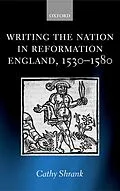Writing the Nation in Reformation England offers a major re-evaluation of English writing between 1530 and 1580. Studying authors such as Andrew Borde, John Leland, William Thomas, Thomas Smith, and Thomas Wilson, Cathy Shrank highlights the significance of these decades to the formation of English nationhood and examines the impact of the break with Rome on the development of a national language, literary style, and canon. As well as demonstrating the close relationship between literary culture and English identities, it reinvests Tudor writers with a sense of agency. As authors, counsellors, and thinkers they were active citizens participating within, and helping to shape, a national community. In the process, their works were also used to project an image of themselves as authors, playing - and fitted to play - their part in the public domain. In showing how these writers engaged with, and promoted, concepts of national identity, the book makes a significant contribution to our broader understanding of the early modern period, demonstrating that nationhood was not a later Elizabethan phenomenon, and that the Reformation had an immediate impact on English culture, before England emerged as a 'Protestant' nation.
Autorentext
Cathy Shrank lectures in Renaissance Literature at the University of Sheffield
Zusammenfassung
Writing the Nation in Reformation England offers a major re-evaluation of English writing between 1530 and 1580. Studying authors such as Andrew Borde, John Leland, William Thomas, Thomas Smith, and Thomas Wilson, Cathy Shrank highlights the significance of these decades to the formation of English nationhood and examines the impact of the break with Rome on the development of a national language, literary style, and canon. As well as demonstrating the closerelationship between literary culture and English identities, it reinvests Tudor writers with a sense of agency. As authors, counsellors, and thinkers they were active citizens participating within, and helping to shape, a national community. In the process, their works were also used to project an image ofthemselves as authors, playing - and fitted to play - their part in the public domain. In showing how these writers engaged with, and promoted, concepts of national identity, the book makes a significant contribution to our broader understanding of the early modern period, demonstrating that nationhood was not a later Elizabethan phenomenon, and that the Reformation had an immediate impact on English culture, before England emerged as a 'Protestant' nation.
Inhalt
- Introduction
- 1: Andrew Borde: Authorship and Identity in Reformation England
- 2: John Leland and 'the bowels of Antiquity'
- 3: William Thomas and the Riches of the Vulgar Tongue
- 4: Thomas Smith and the Senate of Letters
- 5: Thomas Wilson and the Limits of English Rhetoric
- 6: 'Workshops of the New Poetry': The Shepheardes Calender and Old Arcadia
